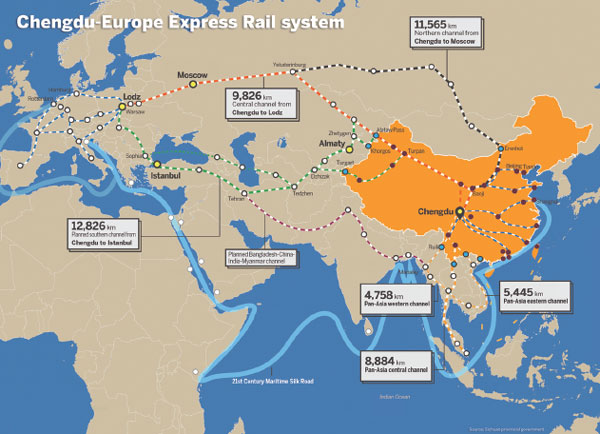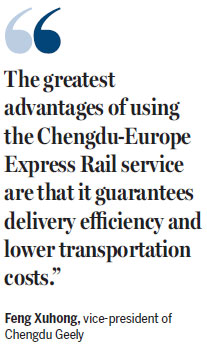Express rail service to keep city's trade growth on track
( China Daily )
Updated: 2017-03-10

Chengdu, capital of Sichuan province, began running freight trains to Belarus on March 1, bringing auto parts ordered by Chinese carmaker Geely for its joint venture in Minsk, capital of Belarus.
The train, running on the northern route of the Chengdu-Europe Express Rail service, is carrying 41 containers of auto parts, and will travel more than 8,800 kilometers over the course of 12 days to reach the Belarusian capital.
Feng Xuhong, vice-president of Chengdu Geely, said the auto parts and accessories, worth nearly $600,000, were made at the company's plants in Ningbo, Zhejiang province, and Chengdu. They will be used to assemble the Geely GC9 luxury sedan in Minsk. Once completed, the vehicles will be mainly sold in Eastern Europe and Central Asia.
"The greatest advantages of using the Chengdu-Europe Express Rail service are that it guarantees delivery efficiency and lower transportation costs," Feng said.
Before the express rail service, Geely used to send car parts to Minsk through combined sea and road transportation routes. "The rail route is much faster, reducing the time from 40 to 12 days," he said.
The Chengdu-Europe Express Rail service, which became operational in April 2013, is the fastest and most frequently used cargo railway route that links the city to European countries, in line with China's Belt and Road Initiative.
Stretching over 9,800 km, the service originally ran a weekly freight train from Chengdu to Lodz, an emerging European logistics hub in Poland.
It was then expanded to other cities such as Kutno in Poland, Nuremberg in Germany and Tilburg in the Netherlands, and finished trial runs to Istanbul in Turkey last year.

One of the most important reasons to build a free trade zone is to promote and facilitate easier trade links and processes. In this regard, the express rail service, which serves as an international logistics corridor linking China and Europe, will play a crucial role in the future development of Sichuan Free Trade Zone, according to the provincial government.
In August, Sichuan was approved by the central government to join China's third batch of an eventual seven pilot free trade zones. Preparation is now moving into the final stages, and it is expected that the launch date will be announced within weeks.
Dai Bin, head of a research center for regional economy and urban management at Chengdu-based Southwest Jiaotong University, said free trade zones must have the foundation to develop large transportation networks, because they, as platforms that integrate into global economic activities, need to maintain close economic ties with countries around the world.
Supported by the express rail service, the Sichuan Free Trade Zone can strengthen cooperation with China's coastal ports, establish more duty-free shops to boost cross-border e-commerce businesses and also better facilitate construction of bonded logistics centers, Dai said.
Over the past four years, many companies have benefited from the express rail service, including DHL Express, Lenovo, TCL and Dell.
The Chinese consumer electronics company TCL, for example, has used the service to transport 99 percent of the color television components produced at its factories in Chengdu and Huizhou, Guangdong province, since January 2016. The components are taken to the factory in Poland, which is the company's largest such facility in Europe, with an annual production capacity of 2.2 million color TV sets.
This year, the company is scheduled to increase its production capacity by an additional 800,000 TV sets at its factory in Chengdu. Components for these TVs will be transported to and assembled in Poland, and the finished sets will be sold throughout Europe.
Liang Tiemin, vice-president of TCL Multimedia, said since Chengdu is the starting point of the express rail service, the company plans to make the city its major manufacturing base for TVs to be sold in Europe.
Dong Mingzhu, chairwoman of the Chinese household appliance manufacturer Gree, is also very optimistic about Chengdu's strategic position and its market potential, saying her company would locate more projects in the city in future.
In 2016, 460 journeys were completed via the express rail service, delivering 73,000 metric tons of goods worth more than $1.3 billion. It is expected to run 1,000 cargo trains to Europe this year.
(China Daily 03/09/2017 page18)



